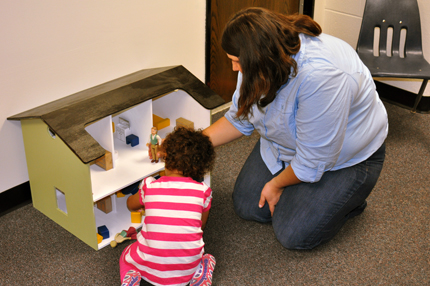Four years after it was established, Wichita State University’s Play Therapy Center continues to be a leader in the state.
Part of WSU’s College of Education, the Play Therapy Center is the only such facility in the Kansas Board of Regents system, and one of just 13 nationwide to earn the Approved Center of Play Therapy Education designation.
Play therapy is a type of therapy that allows children with limited ability to verbally express themselves to speak with adults about their concerns. It also is effective for children who develop at an average pace to express their emotions and work through everyday problems.
“Play is the way children make sense of the world and often cannot express their thoughts and feelings in words,” said Ruth Hitchcock, director of the Play Therapy Center. “They can and do express their concerns...through play.”
The center offers unique training and research opportunities for graduate students and professional counselors and therapists. Those who finish the four classes and practicum earn a graduate certificate.
Rick Gaskill, an adjunct faculty member in Wichita State’s Counseling, Education and School Psychology Program, hopes to encourage play therapy as an increasingly viable option.
“Children compose about one third of our population and 100 percent of our future,” he said. “Brain research and child development research tells us that children use play as a major way to develop intellectually, socially, emotionally and physically. Learning how to use this naturally occurring activity to help children develop is a major step in providing for the health of a society.”
‘A natural process’
WSU has always been ahead of the curve when it comes to play therapy, starting in 1996 with a single class.
It was the first university in Kansas to offer play therapy training and had the first registered play therapy supervisor (RPT-S) in the state.
The one class ultimately evolved to four classes, with the goal of doing a practicum. The certificate program grew from there.
Gaskill said the goal has always been to promote play therapy as a viable treatment option for counselors, social workers, psychologists, and marriage and family therapists.
He also would like to continue publishing articles, research and book chapters advancing the knowledge of the value of play and the use of play therapy with children in home, school and agency settings.
While the center has a play room available for student use and an observation/recording room, Gaskill said he hopes to one day have a clinic that offers internships and participates in active research studies with children, as well as offers developmental information and training for teachers, professionals and especially parents.
“Play is a natural process that is vital to children’s development,” he said. “Also, that parent’s participation in their child’s play and supporting play are crucial to the development of a healthy child.”
Hitchcock said what happens in play therapy varies according to the child. Some may play with puppets, acting out things that have happened. Others will create scenes in a sand tray and others just let the sand run through their fingers.
“The theory is that children have a natural drive toward health and will select the activities they need in order to resolve what is troubling them,” she said.
For more information on Wichita State’s Play Therapy Center, go to www.wichita.edu/playtherapy.


 File
File